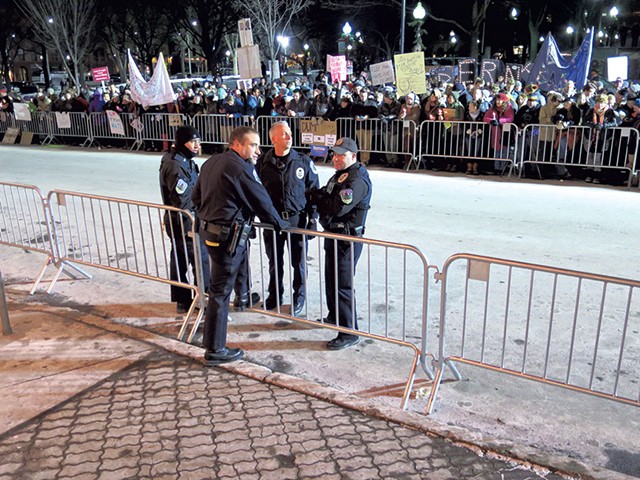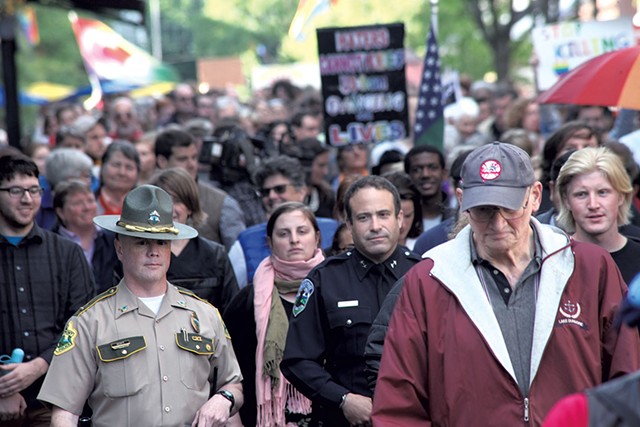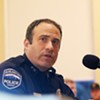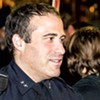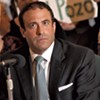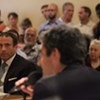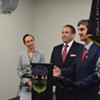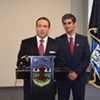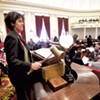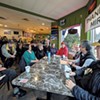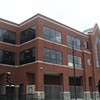Published July 13, 2016 at 10:00 a.m.
Driving up North Street in his black SUV the afternoon of July 1, Burlington Police Chief Brandon del Pozo spotted one of his rookie cops talking with a Somali American man outside the Community Halal Store. Del Pozo, dressed in his dark blue uniform with expertly burnished tuxedo shoes, pulled over and walked up to them.
Abdinur Hassan greeted the chief like an old friend. "Abu Zane!" ("Father of Zane!") he called out, referring to del Pozo's young son Zane.
"I was just learning about Islam," explained Vincent Ross, a lanky officer assigned to patrol North Street on foot.
"Are you observing Ramadan?" del Pozo asked Hassan. Then he added, switching casually to Arabic, "Ba'ad sitta ayoum, inta khallas, nam?" ("After six days, you're finished, yes?")
"Yes, yes, khallas," answered Hassan.
In the year since he arrived in Burlington, del Pozo has become a ubiquitous presence in the city, equally comfortable talking about Islam outside a halal shop, debating drones with privacy advocates or discussing film with a reporter.
The energetic Brooklyn native, an 18-year veteran of the New York City Police Department, was picked by Mayor Miro Weinberger to replace outgoing chief Mike Schirling. It was a controversial choice. Del Pozo endured intense grilling, but in the end he won over the city council. Even so, Burlingtonians may not have fully understood what they were getting: a chief with big ambitions to position this small city at the vanguard of American policing reform.
The Ivy-educated del Pozo is working on a PhD in philosophy and has a book deal with a prestigious publishing house. He's an "intellectual with a badge," says a New York acquaintance, writer Gary Shteyngart.
Hardly an armchair chief, del Pozo combines a philosopher's appetite for discourse with a cop's inclination toward action.
Since his arrival, he's put his department at the center of efforts to address opiate addiction and mental health crises. He has equipped all cruisers with the overdose-reversing drug Narcan. He's created new positions to address domestic violence and community affairs, ramped up online data and increased officer training and foot patrols.
Del Pozo's dogged outreach — he invites imams to lunch; he meets with antipolice activists and then tweets about it — isn't mere image burnishing. It's precisely the kind of community policing he wants his officers to master.
New Haven, Conn., Police Chief Dean Esserman calls del Pozo "one of the future great American police chiefs." Chuck Wexler, executive director of the Police Executive Research Forum, a progressive policing think tank in Washington, D.C., calls him a "rising star" and describes his approach to policing as "iconoclastic."
Del Pozo has become a law enforcement leader during a particularly fraught time in American policing. Last week, police officers killed two black men — in Baton Rouge, La., and outside St. Paul, Minn. Then, at a protest in Dallas on Thursday night, a gunman shot and killed five police officers. The events brought the rift between cops and communities of color into sharp relief.
"Every police department is now inextricably a part of a national debate, and we're no different," del Pozo said during an interview Monday. "There's no room for complacency in American policing right now."
His conclusion: "I believe that, at the root of it all, communities of color and police officers are all good people, and familiarity goes further than anything else in bringing them together. Cultural competency training is crucial, but it's more about citizens and police sharing spaces and experiences day after day." He added: "We can accomplish that."
Del Pozo said he sent a one-line email to Wexler at the end of last week: "Now we're going to see around the country who the leaders are in American policing."
Gathering Intelligence
Del Pozo's father fled Cuba at age 14. He shined shoes and picked tomatoes in Florida before getting drafted and dispatched to Hawaii as a combat medic during the Vietnam War.
Del Pozo is the product of a courtship that began in a mailroom in New York City — his father, who later became a customs broker, was working there when he met a Jewish secretary down the hall.
The family of four — del Pozo's younger brother is now a lawyer — shared half of a Brooklyn duplex with del Pozo's maternal grandparents. His grandfather, who served as a paratrooper and fought in the Battle of the Bulge, was his childhood hero.
"It was clear that the only way I was gonna not be constantly harried in my household was by being a really good student," said del Pozo. Testing into Stuyvesant High School, a prestigious Manhattan public school, changed his life. "The second you get in, your whole understanding of your potential is reset," he noted.
Del Pozo got his first taste of rural New England at Dartmouth College, where he majored in philosophy. He served in the ROTC, joined Kappa Chi Kappa fraternity and lost a bid for student assembly president. Del Pozo also wrote more than 60 columns, often witty and contrarian, for the school newspaper. His subject matter was diverse: He railed against the cost (30 cents) of extra cheese slices in the dining hall, defended fraternities, and advocated for allowing gay people to serve in the military.
In one of his final columns, del Pozo mentioned having met with senior editors at Vanity Fair, the New Yorker and other magazines. But he decided he was "too young to be a writer," he recalled, and instead joined the NYPD. He figured he would "learn a lot about life ... and then go to graduate school."
Del Pozo started out in 1997 as a beat cop, traversing Brooklyn's East Flatbush, often on foot. "I literally looked at a map and said, 'I want the most troubled precinct I could get to on a bike,'" del Pozo said, referring to his mode of commuting. Three police officers were killed in that precinct during his time there.
He was on duty when terrorists piloted planes into the World Trade Center in 2001. Dispatched to the scene, del Pozo helped evacuate the nearby New York Stock Exchange.
Later, the NYPD sent him to the Middle East as part of a terrorism intelligence-gathering unit. Based in Amman, Jordan, for two years, del Pozo helped train that country's first community-policing unit and picked up some basic Arabic in the process. In 2008, he was sent to Mumbai on India's west coast after coordinated terror attacks killed 164 people there. He used ballistics analysis and other techniques to study how the attacks had been carried out.
Back in New York, del Pozo rose through the ranks, investigating police corruption in Manhattan and heading precincts in the Bronx and Manhattan's West Village. Later, as commanding officer for the Office of Strategic Initiatives, he ensured that every precinct became active on social media.
Along the way, del Pozo picked up three master's degrees: public administration from the John F. Kennedy School of Government at Harvard University; criminal justice from the City University of New York's John Jay College of Criminal Justice; and philosophy at CUNY, where he's working toward a doctorate.
From Brooklyn to Burlington
Last summer, del Pozo left the big city to command the police force of Burlington, where the entire population is roughly equal to that of the NYPD.
Colleagues told him "it made no financial sense," recalled the 41-year-old father of two boys, ages 4 and 8. He had qualms, del Pozo admitted, about leaving a secure job with a growing pension at the institution where he'd spent his entire professional life.
Then Robert Wasserman, a consultant to current NYPD Commissioner William Bratton, told del Pozo over lunch, "There comes a time when you need to decide: Do you want to be a cop who looks at himself as a civil servant? Or do you want to be a cop who looks at himself as a leader?"
Del Pozo concluded that he would be able to tackle "real urban problems" in Burlington "not as a functionary, but as somebody who could shape how the problems would be addressed," he said.
The job would also require him to negotiate the politics of policing, which was apparent from the moment Weinberger chose him.
Del Pozo's July 13, 2015 confirmation in front of the city council was the most hostile hearing in recent history. People crammed into Burlington City Hall Auditorium holding signs that read, "No NYPD in BTV." One person called him a "documented racist Muslim hater." Del Pozo looked only faintly uncomfortable as people condemned him.
"Get out of there," texted his wife, Sarah, who was watching online from New York.
He ignored the advice. When it was his turn to talk, del Pozo systematically rebutted the allegations. He also pledged to be a bridge between the police department and the community. "What I really look forward to is sort of that complete lack of privacy I'm gonna have on and off duty," he told the council.
Eleven of the 12 city councilors voted for him; one abstained, citing a professional conflict of interest.*
"That was the first time I realized, wow, he was born to be a police leader," his wife said later.
Del Pozo's response: "If this was an indifferent populace, I wouldn't be interested in being a part of its civic life."
A year after his confirmation, the chief still hasn't adjusted to Burlington's dress code; he's possibly the only person in the city who sports a pocket square. But he fits in when it comes to extracurricular pursuits: skiing, ice climbing, biking and hiking in all seasons. He sometimes documents his adventures on social media. Burlington's proximity to mountains was a large part of its appeal for del Pozo, who also has a house in the Adirondacks.
The fit, square-jawed chief doesn't seem to have a resting state. During a police commission meeting earlier this month, he was alternately talking, jotting something down in his black notebook as someone else spoke, or texting under the table. He gives thoughtful, nuanced answers laced with scholarly references — often apologizing for their length midway through.
Asked about the racial dynamics of Vermont's opiate trade, in which many out-of-state dealers are men of color, del Pozo responded, "We can't turn minority communities into the bogeyman of the opiate crisis. A real worry I have is, when we talk about who is bringing drugs to town and really exploiting the community, if we talk about them being predominantly people of color, there's this worry that Vermonters will look at their neighbors of color in the same light. That's a problem."
Del Pozo is image conscious and careful with his words. But he also retains a beat cop's bluntness. Talking again about racial patterns in the opiate trade, he said, "There is injustice packed into this, but that doesn't mean we can take it lying down. I mean, it's killing people."
Off the record, he'll convey in less diplomatic lingo his frustration at the pace of progress, or with a certain agency's reticence to innovate. Then he'll apologize for going off the record and reiterate his commitment to transparency.
Del Pozo remains, as the mayor put it, a cop's cop. He's the kind of executive who gets out of bed at 2 a.m. to be at the scene while his officers apprehend a man who threatened his girlfriend with a gun.
His office is decorated with police paraphernalia from his NYPD career: helmets, badges, even a ceremonial dagger. But del Pozo's bookshelf reveals broader interests: Next to Cop in the Hood and Varnished Brass is The Pale King, David Foster Wallace's posthumous novel about postindustrial working life.
Del Pozo, who has kept a journal since high school, still has a creative bent. He gets animated discussing "Sunday 1287," the short film he wrote and directed last year; it was based on a lightly fictionalized account of a murder in his New York precinct. Last week, it was selected for screening at the 2016 Middlebury New Filmmakers Festival.
After writing one novel that he never tried to sell, del Pozo is working on a nonfiction book. Top-notch publisher Farrar, Straus and Giroux has picked it up.
While living in New York, del Pozo traveled in literary circles, attending Paris Review galas and dining with acclaimed authors. He met writer Shteyngart at one such dinner.
Shteyngart told Seven Days that he frequently asks but is rarely able to convince his agent to represent friends. When he put her in touch with del Pozo, however, she jumped at his proposal to write a book about American policing, told through his experiences at the NYPD.
"He's a cop who is very erudite, who is able to write about law enforcement in a way that's going to be very new and unexpected," predicted Shteyngart. "I think it will get a lot of attention."
Del Pozo, who had to be cajoled into talking about his artistic endeavors, said he assured the mayor, "First and foremost, I'm a chief of police and, second, a writer about policing." As evidence, he noted that his draft is overdue.
Put to the Test
After his confirmation in Burlington, del Pozo continued to make overtures to residents who might be inclined to mistrust him. The chief, who has made it a priority to strengthen ties between his department and New American communities, went up and down North Street introducing himself to shop owners. That's how he met Hassan.
Evidence that his strategy has worked: A pacifist who objects to the institution of policing had positive things to say about him after he reached out to her. "He's definitely forward-thinking in ways that I have not previously seen," said Rachel Siegel, a former city councilor and executive director of the Peace & Justice Center.
An event occurred on March 22 that tested del Pozo's commitment to transparent and accountable policing. After a five-hour standoff, one of his officers shot and killed an elderly schizophrenic man, Ralph "Phil" Grenon, who was armed with two knives. The incident reignited a debate in Burlington about lethal force and how to respond to people in crisis.
In the months afterward, del Pozo, who was at the scene, has defended his officers' actions. But he's also proven unusually willing to discuss how his department can do better. And he publicly released virtually all of the police body-camera footage, which is often withheld.
Among the outraged citizens was Shay Totten, a former Seven Days columnist who has a son with autism, and who went on what Totten himself described as a "bit of a Twitter rant."
Del Pozo messaged Totten and invited him to a meeting of residents and cops to discuss the shooting. Later this month, Totten is giving a presentation to the police force about coping with mental illness.
At the end of an interview about Grenon's death, Burlington Free Press publisher Al Getler asked del Pozo, "So, what do you say to the Monday-morning quarterbacks who are still out there?" The chief was being offered a chance to defend his department but responded: "I think they need to continue to Monday-morning quarterback. We took a human life."
"He's really reflective and much less defensive than other police executives I've met before," said Sarah Kenney, who chairs the police commission, a volunteer board that advises the department.
Del Pozo is not willing to endlessly rehash, however, and has little patience for purely abstract discussions.
"One of the overriding priorities of my time here is to create a police force that is very, very good — that's the best police force in Vermont — at dealing with acute mental health crises in a safe way," del Pozo said.
While that will require close collaboration with other agencies such as the Howard Center and the Burlington Housing Authority, del Pozo hasn't waited to take action. He's already sent several officers to participate in use-of-force and de-escalation training. And he's ordered polycarbonate shields for his officers, which he thinks could reduce the need for force.
Back on the Beat
Del Pozo is also cognizant of the more quotidian quality-of-life concerns that preoccupy residents. (His family bought a house on South Union Street in the relatively tony Hill Section and gets the stray drunk college kid taking a shortcut through his backyard.)
On July 1, he was driving around the city, checking in with officers assigned to patrol Burlington by foot. Del Pozo didn't invent the foot patrol, as veteran police officers are keen to clarify. But, in a move widely praised by the community, he has increased their frequency and focused on "hot spots." That is, areas plagued by drug dealing, such as North Street, or persistent panhandling, such as the intersection of Church and Cherry streets.
Heading down North Street, del Pozo noted that he'd gotten the Public Works Department to install streetlights that are 40 watts brighter. Later, parked at the corner of Church and Cherry, he observed that his request for the grime to be power-washed off Rite Aid's white wall had so far gone unmet.
While he was stopped, Nancy Kirby, a Burlington resident who works at nearby Champlain Leather, came up to the window to thank del Pozo for stepping up the police presence.
The chief was clearly delighted by the unbidden praise. "I'm blushing," he told her, grinning. But as soon as Kirby left, he returned to the point he'd been making to a reporter: He's aware that focused foot patrols will push troublesome activity to other streets, not eliminate it. To achieve a more lasting effect, del Pozo plans to employ the kind of person-specific, data-driven approach that he's been championing.
After reviewing civil fine data, his department has identified some 15 people who have accumulated an average of 40 tickets each for offenses such as public intoxication, public urination and aggressive panhandling. On average, they've each paid one.
Del Pozo is working with the Chittenden County State's Attorney's Office and the city to implement a harder-line approach in such cases. In lieu of fines that rarely get paid, he wants to start pursuing criminal charges against repeat offenders who congregate downtown.
This approach will be employed for the "smallest number of the biggest offenders," who already have lengthy rap sheets, del Pozo stressed. "We're not criminalizing people who haven't already criminalized themselves."
Even so, this more punitive approach will likely be unpopular in certain camps.
Jared Carter, a Vermont Law School professor who directs the nonprofit Vermont Community Law Center, credited del Pozo with using community policing to control drug activity on North Street, where he lives. But, citing concerns about civil liberties, he deemed the chief's tenure a "mixed bag." For example, Carter said, he's spoken with homeless people who say officers are overzealous in enforcing city ordinances against panhandling and trespassing.
Internal Affairs
Some of what del Pozo does — requiring rookie cops to watch the play Black Angels Over Tuskegee, or bringing in an imam to teach them about Ramadan — might cynically be viewed as public relations stunts designed to please the community at the expense of his officers.
What do they think of their chief's approach?
"Not everything has been smiles and hugs, but it's not adversarial, either," said Cpl. David Clements, president of the Burlington Police Officers Association. "A lot of the things he is hoping to accomplish, in my opinion, probably require more staffing," he noted. In particular, Clements is concerned that some of del Pozo's specialized positions, such as community affairs officer and domestic violence prevention officer, come at the expense of the regular patrol division.
But del Pozo is "way more willing to listen to whatever those issues may be — in a genuine way," said Clements, who's worked under four BPD chiefs. While previous chiefs have been "excellent external leaders," Clements noted, "We really were lacking internal support." He applauded del Pozo for putting "an emphasis on an officer's well-being."
Hours after the killing of the Dallas policemen last Thursday, del Pozo suspended solo patrols for his officers, citing safety concerns.
Higher Calling?
Del Pozo is already attracting national attention. In May, the Police Executive Research Forum gave him its Hayes Award, presented annually to an up-and-coming chief. Typically the honor goes to a big-city chief; NYPD Commissioner Bratton was a recipient earlier in his career.
"He's not afraid to challenge conventional thinking," said director Wexler. Wexler said he was particularly struck by del Pozo's response after the Grenon shooting, and by his willingness to critique his own practices.
Last Saturday, the New York Times featured Burlington's chief in a story about law enforcement's reaction to the string of tragedies in Baton Rouge, Minneapolis and Dallas.
Asked about the interview, del Pozo sounded both eager to weigh in and wary of being branded as a talking head: "You want to be part of that national debate, but you also want to keep on doing it at home," he said.
Given his quick rise to prominence, it's reasonable to wonder how long he'll stick around. While del Pozo thinks the three-year average tenure for a police chief is too short, he doesn't expect his current gig to be "a 10-year job."
"I would love to stay in policing past being the Burlington chief," he said.
His people skills, cogency and sangfroid under verbal fire have also fueled speculation on whether he might pursue a political career.
Del Pozo was prepared for that question. His answer: "I'm not seriously considering politics, because the idea of constantly having to do what it takes to raise money to continue to do your job seems like capitalism. It doesn't seem like democracy."
He did hint at other inclinations.
"What I love about policing now is how creative you can be, and I think whatever I do after this, I want it to be something where I can make a difference by being creative," said del Pozo.
"There are also things like writing and film," he added. "You could tell a story that matters to Americans about something like drugs and policing."
*Correction, July 18, 2016: An earlier version of this story misstated the number of councilors who voted for Chief del Pozo at his confirmation hearing.
The original print version of this article was headlined "Scholar in Chief"
More By This Author
About the Artist

Matthew Thorsen
Bio:
Matthew Thorsen was a photographer for Seven Days 1995-2018. Read all about his life and work here.
Matthew Thorsen was a photographer for Seven Days 1995-2018. Read all about his life and work here.
Speaking of...
-

Overdose-Prevention Site Bill Advances in the Vermont Senate
May 1, 2024 -

Aggressive Behavior, Increased Drug Use at Burlington's Downtown Library Prompt Calls for Help
May 1, 2024 -

Reinvented Deep City Brings Penny Cluse Café's Beloved Brunch Back to Burlington
Apr 30, 2024 -

Burlington’s Blue Cat Steak & Wine Bar Closes After 18 Years
Apr 30, 2024 -

Burlington Budget Deficit Balloons to $13.1 Million
Apr 25, 2024 - More »
Comments (7)
Showing 1-7 of 7
Comments are closed.
From 2014-2020, Seven Days allowed readers to comment on all stories posted on our website. While we've appreciated the suggestions and insights, right now Seven Days is prioritizing our core mission — producing high-quality, responsible local journalism — over moderating online debates between readers.
To criticize, correct or praise our reporting, please send us a letter to the editor or send us a tip. We’ll check it out and report the results.
Online comments may return when we have better tech tools for managing them. Thanks for reading.


































